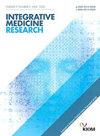中药治疗痛经的有效性和安全性:一项多中心前瞻性观察性研究分析
IF 3
4区 医学
Q2 INTEGRATIVE & COMPLEMENTARY MEDICINE
引用次数: 0
摘要
本研究旨在评价中药单方煎剂治疗痛经的有效性和安全性。将草药汤剂与其他草药配方和联合治疗方式进行比较,重点是减少月经疼痛强度、持续时间和止痛药的使用。假设个性化的草药治疗可以通过解决个人体质失衡来更有效地缓解症状。方法本前瞻性观察研究在韩国33家韩医诊所和1家韩医医院进行,纳入135名受试者。根据所接受的治疗,将参与者分为三组:单纯中药汤剂组(单纯中药汤剂组,n = 82)、中药汤剂加针灸等辅助治疗组(联合组,n = 37)和非中药汤剂组(非中药汤剂组,n = 16)。在至少一个月经周期内进行治疗,并在每个周期后评估结果。主要结局包括疼痛强度(数值评定量表)、月经疼痛持续时间和使用镇痛药频率的变化。通过临床访问期间的不良事件监测来评估安全性。结果与服用其他中药制剂的患者相比,复方凉保汤仅能显著减少月经疼痛强度、疼痛持续时间和镇痛药的使用。大多数不良事件是与口服摄入有关的轻微胃肠道症状,无需干预即可解决。无严重不良事件报告。结论人参汤组可显著降低痛经强度、持续时间及镇痛剂量。这些研究结果表明,中药汤剂可能是一种安全有效的治疗痛经的个性化选择。本文章由计算机程序翻译,如有差异,请以英文原文为准。
Effectiveness and safety of herbal medicine on treatment of dysmenorrhea: An analysis of a multicenter, prospective observational study
Background
This study aimed to evaluate the effectiveness and safety of individually prescribed decoction herbal medicine for the treatment of dysmenorrhea. Herbal decoction was compared to other herbal formulations and combined treatment modalities, focusing on reductions in menstrual pain intensity, duration, and analgesic use. Personalized herbal treatments were hypothesized to alleviate symptoms more effectively by addressing individual constitutional imbalances.
Methods
This prospective observational study was conducted at 33 Korean medicine clinics and one Korean medicine hospital in South Korea, enrolling 135 participants. Based on the treatment they received, participants were categorized into three groups: herbal decoction only group (Decoction only Group, n = 82), herbal decoction with adjunctive therapies such as acupuncture or moxibustion (Combination Group, n = 37), and non-herbal decoction formulations (Non-decoction Group, n = 16). Treatments were administered over at least one menstrual cycle, and outcomes were assessed after each cycle. Primary outcomes included changes in pain intensity (numerical rating scale), duration of menstrual pain, and frequency of analgesic use. Safety was assessed through adverse event monitoring during clinic visits.
Results
Herbal decoction only showed significant reductions in menstrual pain intensity, pain duration, and analgesic use compared to those receiving other herbal formulations. Most adverse events were mild gastrointestinal symptoms related to oral intake, which resolved without intervention. No serious adverse events were reported.
Conclusions
Herbal decoction group significantly decreased the intensity and duration of menstrual pain and analgesic dosage. These findings suggest that herbal decoction may be a safe and effective personalized treatment option for dysmenorrhea.
求助全文
通过发布文献求助,成功后即可免费获取论文全文。
去求助
来源期刊

Integrative Medicine Research
Medicine-Complementary and Alternative Medicine
CiteScore
6.50
自引率
2.90%
发文量
65
审稿时长
12 weeks
期刊介绍:
Integrative Medicine Research (IMR) is a quarterly, peer-reviewed journal focused on scientific research for integrative medicine including traditional medicine (emphasis on acupuncture and herbal medicine), complementary and alternative medicine, and systems medicine. The journal includes papers on basic research, clinical research, methodology, theory, computational analysis and modelling, topical reviews, medical history, education and policy based on physiology, pathology, diagnosis and the systems approach in the field of integrative medicine.
 求助内容:
求助内容: 应助结果提醒方式:
应助结果提醒方式:


